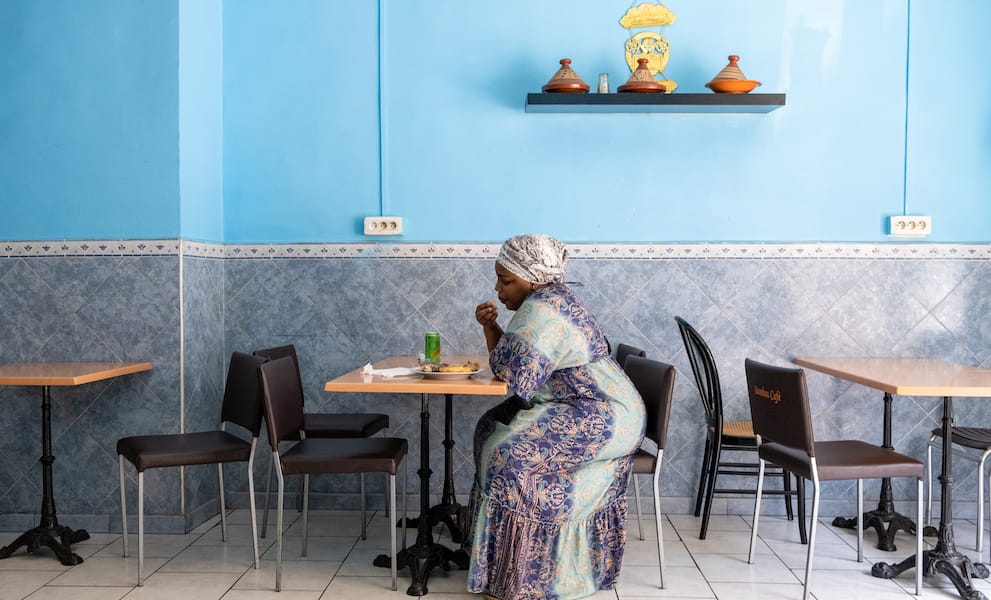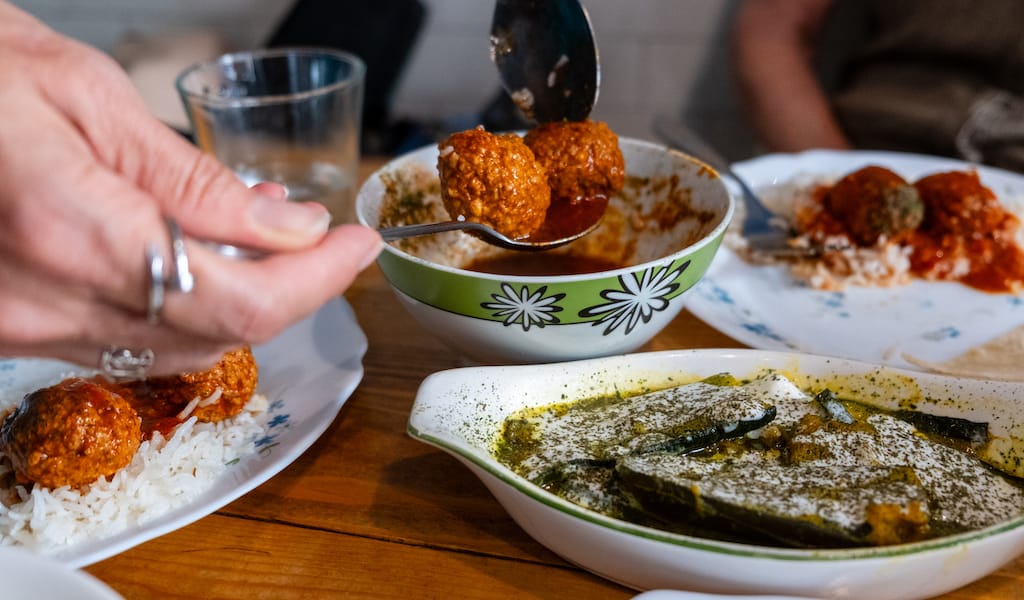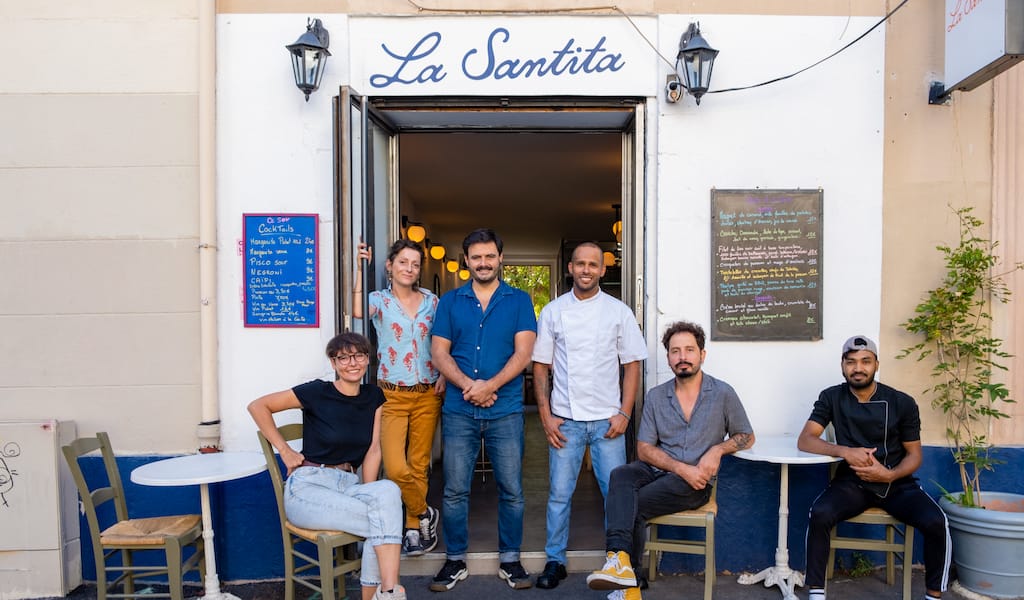Italian and Maghreb restaurants are undoubtedly the stars of Marseille’s food scene. In fact, Marseille is so chock-a-block with pizza it’s rumored to have more pizzerias per capita than New York City. Eateries dishing out copious bowls of couscous equally abound. Meanwhile, some of the diverse city’s most prominent immigrant communities – and their cuisine – remain behind the scenes.
A perfect example is Marseille’s Comorian community. So many citizens of Comoros, the Indian Ocean nation north of Madagascar, live in Marseille that the city’s been nicknamed the “Fifth island in the archipelago.” One in ten Marseillais are of Comorian descent, and many are employed in restaurant kitchens as dishwashers and line cooks. Yet, you can count the places serving cuisine comorienne on one hand.
As is the Marseille way, we found one through word of mouth.

We would probably not have found L’Original otherwise. Located on a side street near the Hôpital Européen, the small spot looks like an unassuming snack from the outside. The sparse interior is equally subdued, save for the bright blue walls that match the jerseys of the local football club, L’OM. One whiff of beef skewers sizzling on the flattop suggests we’ve come to the right place.
A table of construction workers hungrily slurps beef stew. Besides them, two women dip wedges of manioc into hot sauce, eating with their hands, the Comorian way. The owner, Moussa Mroivili, hands a grilled chicken wing from his plate to a woman sitting alone, insisting she try them. Everyone knows the smiling chef, and some know each other. “It’s very familial here,” he smiles, explaining that his compatriots usually prefer to eat at home with loved ones – our first clue into the absence of Comorian restaurants in Marseille. And why L’Original feels like you’re eating at Mroivili’s house.

Les comoriens first arrived in Marseille in the 1940s as sailors and soutiers, coal stockers, followed by an influx of workers to rebuild the city post World War II in the 1960s. Since 1975, when the Union of the Comoros gained independence after a century of French colonial rule, many Comorians have migrated to France for work and to flee political and socioeconomic unrest. Tens of thousands chose Marseille to join relatives – and for its similar climate on the Mediterranean.

Born in Île de Réunion to Comorian parents, Mroivili has been in Marseille since he was two years old. The now 50-year-old chef grew up in the city’s oldest neighborhood, Le Panier. “It was a great mix…the Comorians lived on Rue de Poiret, the Arabs on Rue Baussenque, and Place de Lenche was Corsican,” he recounts. Mroivili loved the sociability of the different cultures, he says, unlike his compatriots’ tendency to keep to themselves (another clue to the missing Comorian restos).
School wasn’t his thing, but working at his friend’s family’s restaurant was. After obtaining his professional cooking certificate at Marseille’s Bonneveine culinary school, he worked his way up in local restaurant kitchens to a sous chef job at the French brasserie, Massilia Café. Frustrated by the long hours, low pay, and being ordered around, Mroivili bought L’Original in the quartier comorien, La Villette, from a fellow Comorian. He didn’t change the decor, save for adding L’OM blue paint and a flag. “I went to all the matches as a kid,” gushes the “lifelong fan.”

L’Original initially served sandwiches, but Mroivili wanted to use his cooking skills to make Comorian classics. “Many things in the Comoro Islands come from elsewhere,” shares the chef, referring to the Indian, Madagascar, Arabic, and African influences. “I shop every day for fresh ingredients. If there are leftovers, I eat them,” he laughs, patting his belly. Meat and starch play a primary role in cuisine comorienne, so each morning, Mroivili marinates beef cubes with mustard, lemon, shallots, and chili for mchakiki (beef skewers). He simmers beef, ginger, and onions for a simple yet flavorful ntibe stew – L’Original’s signature dish – and steams manioc in a giant metal pot. Mabawa – red pepper & garlic chicken wings – and green bananas are fried to order. Often on Thursdays and Fridays, the affable chef will make madaba, stewed manioc leaves and coconut milk, or whole daurade (sea bream). He keeps the menu small since he does it all: preps, cooks, serves, and cleans.

We like adding heat to the dishes with the house-made hot sauce, a secret recipe with piment antillais (habanero) that is reminiscent of a rougail (a condiment used often in créole cuisine from the Indian Ocean.) Customers can pair the dishes and sides they want, or, like our group of three, order one of everything for a family-style meal. Depending on how much you eat, lunch runs 7-10 euros. “I’m not here to make a huge profit,” admits Mroivili, explaining the Comorians belief that money is for sharing and lending a helping hand.

“In fact, we think going to restaurants is a waste of money,” he continues, as we return to the reasons why Comorian restaurants are rare in Marseille. “Why would you pay to eat out when your friends and family host you for free?” There’s also the fact that the mostly-Muslim populace doesn’t drink alcohol, which goes against the French tradition of wine with meals. Lastly, he says, the discrete Comorians prefer to socialize amongst themselves. Interestingly, it is this strong sense of community that has secured restaurant work for so many of them. Those with current gigs spread the word to new arrivals so that no one struggles to find employment. Mroivili beams, “Our best quality is mutual aid.” His words ring true when his friend calls the restaurant to ask if Mroivili needs any last-minute ingredients.
Though the chef feels “One-hundred percent Marseillais” he keeps Comoros hours: non-stop service, rather than France’s limited meal windows. Most of his clientele are friends or fellow Comorians since he doesn’t advertise (note: Google says – incorrectly – that L’Original is permanently closed). We found our way here via recommendation by a Comorian chef, and, thanks to Mroivili, we got a crash course in Comoros. And will return for more lessons.
Published on June 29, 2023
Related stories
April 19, 2024
MarseilleAt the end of a long wooden table, a foursome passes colorful plates of food: mouthwatering meat dumplings in tomato sauce, sauteed zucchini topped with minty yogurt, and rice flecked with cumin. Sitting across from a refrigerator, below a row of fake potted plants and beside shelves stacked with mismatched plates, they could be dining…
November 7, 2023
MarseilleWe all have our favorite watering hole – that place close to home where you can have a bite to eat, sip on your preferred drink, have a chat with neighbors, friends, strangers. A place where you feel welcome and frequent often. La Santita, a tiny Latin American restaurant located on the tree-lined Boulevard Eugène…
June 5, 2023
Marseille | By Jenine Abboushi
MarseilleThe walk to Sur le Pouce, a popular Tunisian family restaurant, is a straight shot from Marseille’s central boulevard, La Canébiere. We make our way along rue Longues des Capucins, behind Alcazar, the main public library, pass the Chinese wholesale clothing stores – Joy Lady, Wei Wei, and New 35 – and arrive ten minutes…























































































